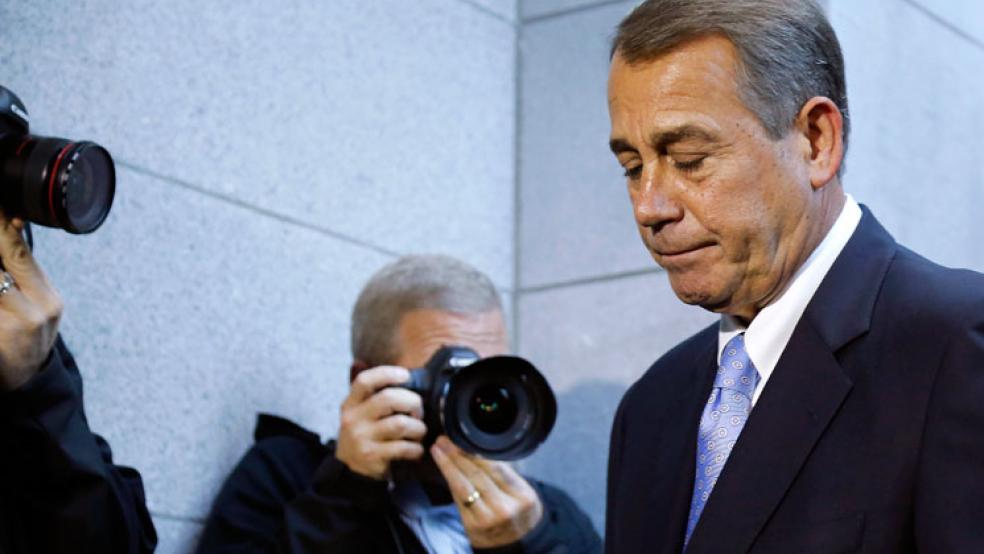Of course, House Speaker John Boehner’s debt ceiling plan—a last minute gambit to pressure Senate Democrats—just blew up in his face.
This should come as no big surprise to anyone following the legislative miscalculations of Republican congressional leaders over the past year. Even sympathetic conservatives might need to worry about the consistent inability of Boehner (R-OH) to manage his own caucus.
RELATED: DEMS ACCUSE BOEHNER OF SABOTAGING A SENATE DEAL
The House cancelled on Tuesday night a vote on the plan floated earlier that morning by GOP congressional leaders. It steadily morphed throughout the day as Boehner’s team found they lacked the votes inside their own caucus to pass the measure, causing late night negotiations as Republican congressional staffers brought pizzas into House leadership offices.
This means that an entire day was lost as Republican congressmen tried to get their ducks in a row, putting the nation just 48 hours away from the possibility of the first government default in U.S. history. The consequence was a tumbling stock market and Fitch Ratings placing the U.S. creditworthiness on “negative watch.”
As has happened multiple times through Boehner’s tenure, his efforts to show a unified Republican conference only serve to reveal the extent of its fracturing.
“The votes aren’t there,” a House leadership aide told the National Review. “We’ve been amending the bill all day, but we’ve been unable to get people around this strategy.
Heritage Action, the political wing of the Heritage Foundation, a conservative think tank, pledged to score the vote before its cancellation. “The proposed plan will do absolutely nothing to help Americans who are negatively impacted by Obamacare,” the group said in a statement.
The Tea Party-affiliated FreedomWorks called the limited Obamacare restrictions in the House bill “insufficient,” arguing that the measure would do nothing to delay the implementation of the 2010 Affordable Care Act. “It's basically a full surrender to the intransigent Left and another win for the insulated Beltway elites,” FreedomWorks president and CEO Matt Kibbe said in a letter.
At the same time, business groups such as the U.S. Chamber of Commerce that contribute to Republican causes have urged the passage of a debt ceiling increase, rather than knee-capping the economy with the first government default in the government’s history.
Some GOP congressmen prefer no action whatsoever, if it means compromising their ideology and enabling Obamacare—which opened its health insurance exchanges this month—to continue.
“Put me in the ‘no deal’ is better than a ‘bad deal’ category,” tweeted Rep. Thomas Massie (R-KY).
RELATED: COULD FITCH RATINGS BE THE JOLT CONGRESS NEEDS?
Here’s the basic gist of what House Republicans failed to vote on:
Just like the Senate deal that was put on pause by Boehner’s actions, the House bill would have reopened the government through Jan. 15 and raised the debt limit until Feb. 7. It also would require that the verification of income levels for Americans who receive government subsidies to buy Obamacare health insurance.
But the abandoned House bill would also have banned President Obama from using “extraordinary measures” to stave off a default when the debt ceiling is breached. It also failed to provide a bicameral committee for negotiating a larger budget deal.
And—against the veto threats of Obama and opposition of Senate Democrats—the bill initially would have removed subsidies to help congressional and White House staffers to buy health insurance and would have delayed for two years the medical device tax, a provision of their plan that was later removed by Tuesday afternoon.
In other words, conservatives were unhappy with a measure that the Senate would have blocked anyway. This essentially undercuts Boehner’s ability to negotiate, since he cannot back up his promises with action in the House.
Amazingly, these kinds of failures have become standard operating procedure among the House GOP caucus. Boehner lacks the authority of groups such as Club for Growth and Heritage Action that help finance conservative challengers in Republican primary elections.
In April, House Republican leaders pulled a measure that tweaked Obamacare to fund high-risk health insurance bills for Americans with preexisting conditions. Conservatives wanted to repeal the Affordable Care Act, rather than make marginal changes to the law.
The Ohio congressman’s “Plan B” on the fiscal cliff failed last year, after fellow GOP lawmakers refused to back a tax rate increase on incomes above $1 million. As a result, a separate deal was struck through the Senate that raised rates on families with incomes above $450,000. That measure cleared the House with Democratic support, a sign of how the failure undermined Boehner’s ability to negotiate.
When Boehner met with his caucus to pull Plan B, he uttered a prayer that encapsulates his speakership.
“God,” Boehner said, “grant me the serenity to accept the things I cannot change.”




